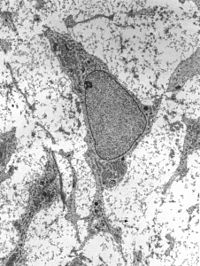
Photo from wikipedia
Based on our previous findings that prenatal ethanol exposure in offspring increased susceptibility to adult osteoarthritis, this study aimed to further investigate the direct toxicity of ethanol on fetal articular… Click to show full abstract
Based on our previous findings that prenatal ethanol exposure in offspring increased susceptibility to adult osteoarthritis, this study aimed to further investigate the direct toxicity of ethanol on fetal articular cartilage development. Rat bone marrow-derived stroma cells were capsulated in alginate beads, incubated in a chondrogenic differentiation medium, and cultured for 4 weeks with ethanol treatment at concentrations of 0, 4, 20, and 100 mM. Pregnant rats were treated with ethanol (4 g/kg/day) from gestational days (GDs) 9 to 20. At GD20 and postnatal weeks 2, 6, and 12, 8 male offspring were sacrificed, and 8 male offspring rats of 8-weeks old in each group were treated with or without intraarticular injection of papain for 4 weeks to verify the susceptibility of adult osteoarthritis. Ethanol treatment resulted in poor differentiation of bone marrow-derived stroma cells to chondrocytes and suppressed the expression of the transforming growth factor-β (TGFβ)-smad2/3-Sox9 signaling pathway. In animal experiments, the shape of articular cartilage in the ethanol treatment group was more disordered than that of the control group, the matrix was not deep, and the cartilage was thin, which showed poor cartilage development. The TGFβ signaling pathway in the ethanol treatment group was persistently low at all time points. After intraarticular injection of papain, histological analyses, and the Mankin score revealed increased cartilage destruction in the ethanol treatment group. Ethanol caused articular cartilage dysplasia that was programmed in adulthood via a low-functional TGFβ signaling pathway, and the tolerance of this articular cartilage to external stimuli was significantly decreased.
Journal Title: Toxicological Sciences
Year Published: 2018
Link to full text (if available)
Share on Social Media: Sign Up to like & get
recommendations!